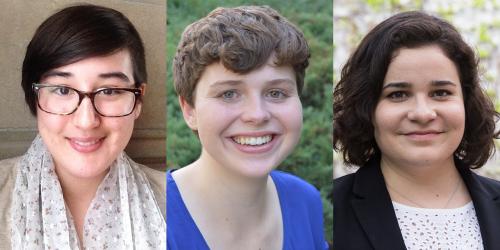Wellesley has selected the winners of the 2017 annual Stanford Calderwood Prizes in Public Writing, which recognize exceptional pieces written by students in the Calderwood Seminar in Public Writing program. The program teaches students to translate complex arguments and professional jargon from their disciplines into writing intended for a broad audience.
“The winners of the Calderwood Prizes all select interesting topics, address their audiences, and make their points accessible,” said David Lindauer, Stanford Calderwood Professor of Economics. “In judging the essays nominated by the faculty who taught these seminars, the selection committee considered how well and quickly a general reader is oriented to the topic; how much expertise and thoughtfulness is evident in the analysis; and how consistent and authoritative the writing is.”
This year’s Calderwood Prizes were awarded to Emma Stelter ’16, humanities; Sarah Koenig ’17, social sciences; and Hannah Schmidt ’18, sciences.
Stelter’s winning essay, “Ida: A Movie Review,” from the Calderwood seminar Advocating for Other Countries with Barry Lydgate, professor of French, analyzes director Paweł Pawlikowski’s depiction of a novice nun and her brash aunt and the difficult choices they face in Communist Poland during World War II.
“I’m someone who tends to multitask when I watch TV or movies, but I remember sitting in Tower dining hall on a Sunday morning, watching Ida on my phone and being completely sucked in,” said Stelter. “The film doesn’t give watchers much in the way of emotional cues, which I find rare for a historical drama. As a result, it demanded my full attention. I wanted to convey that experience in my essay.”
Stelter, who double majored in French and history, said she took the Calderwood seminar during her last semester at the College to stretch herself as a writer and because she enjoyed the writing-heavy classes she took in her first year.
She found the Ida essay the most challenging to write. “Because we were all reviewing the same film…writing the essay was an exercise in finding the idea that made my review my own.” she said. “The seminar also reinforced my belief that writing is a collaborative effort: There are very few pieces that can’t be improved with an extra set of eyes.”
Koenig’s essay, “Oysters are an Ecologist’s Best Friend,” was written for Environmental Synthesis and Communication with Jay Turner, associate professor of environmental studies. In it, she shows how Anamarija Frankic, an ecologist and biomimicry fellow at UMass Boston, is reintroducing oysters to Boston Harbor to help filter the water and restore a resilient and sustainable coastal ecosystem to what then-Vice President George H. W. Bush in 1988 called the “dirtiest” harbor in America.
Koenig’s piece opens with a description of Frankic, “in her bright yellow windbreaker and tall blue rain boots,” trudging through thick coastal underbrush down to the water. “I wanted readers to feel like they were trudging around tidal coves right along with me,” said Koenig, an environmental studies major, who used elements of creative writing to highlight “the creative and innovative approach that Dr. Frankic is using to restore the health of the harbor’s ecosystem, as well as the importance of that work.”
The Calderwood seminar was Koenig’s first experience with public writing and allowed her to practice—and eventually perfect—how to concisely and effectively communicate complex issues to a general audience, she said. “I also learned that interviewing someone is not as daunting as it may seem, and to go with the flow and say ‘yes’ when your subject invites you to spend more time with her.”
Schmidt’s essay, “Unnatural Amino Acids: An Attempt to Play God or a Breakthrough in Fighting Disease?” from Advances in Chemical Biology with Don Elmore, associate professor of chemistry, examines the work of Peter Schultz, of the Scripps Research Institute, who genetically modifies proteins that make up the human body in order to design innovative treatments for a range of debilitating diseases. A comment Schultz made in an interview suggesting that these unnatural amino acids allowed him to “play God” sparked controversy regarding whether he should receive continued support from the National Institutes of Health.
“The word ‘unnatural’ can be a little alarming, especially since it sounds as if these researchers are trying to create their own genetic code,” said Schmidt, a chemistry major. “However, this is not the case. Unnatural amino acids are simply an innovative tool for understanding and treating serious diseases like Parkinson’s, HIV, and cancer. Through my essay, I hoped to advocate for continued NIH funding of unnatural amino acid research by explaining its importance to the general public.”
Schmidt said the variety of assignments in the Calderwood seminar pushed her to keep adapting her writing style for different audiences and purposes. “For this particular piece, I remember being told that the tone in my initial draft was completely wrong for an op-ed. However, after taking into account the comments I received and reading more op-eds, I developed it fairly quickly into a piece I’m really proud of,” she said.
In 2016, 71 students completed a Calderwood seminar, in which they wrote five or six essays each and revised them in multiple drafts. Eight Calderwood seminars will be offered next academic year, including the new course Perspectives on American Politics.




